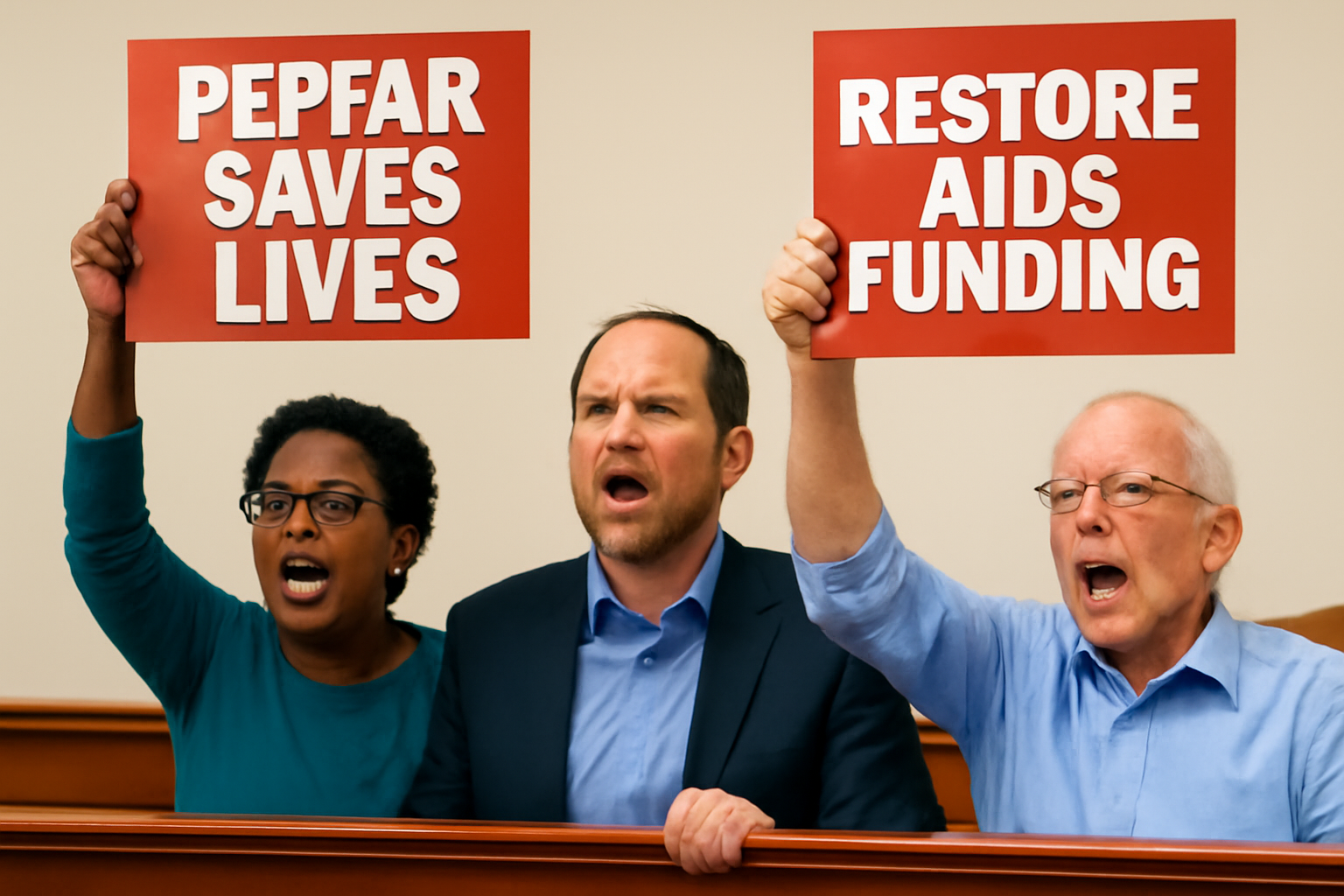
On Thursday, five HIV/AIDS activists were taken into custody by Capitol Police after disrupting a House Foreign Affairs Committee hearing. The session was centered on the U.S. Agency for International Development and its operations.
The activists, among whom were Asia Russell, Executive Director of Health GAP, Charles King, CEO of Housing Works, and Eric Sawyer, a co-founder of ACT UP NY, interrupted the proceedings with chants. They called out "PEPFAR saves lives. Restore AIDS funding now" during the testimony of Max Primorac, a senior research fellow at the Heritage Foundation's Margaret Thatcher Center for Freedom. The demonstrators displayed posters proclaiming "Leadership is crucial: Fund PEPFAR, save lives."
In the preceding month, the U.S. administration, under President Trump-Vance, had implemented a freeze on almost all foreign aid expenditures for a period of no less than 90 days. Fortunately, Secretary of State Marco Rubio issued a waiver shortly thereafter, permitting PEPFAR and other critical humanitarian programs to proceed amidst the funding pause.
Reports from last week highlighted the grave situation faced by PEPFAR-supported initiatives in Kenya and other nations across Africa. The suspension of U.S. financial support had led some services to scale back dramatically or even cease operations. This had significant implications for the global movement advocating LGBTQ rights, as the Trump-Vance administration had been actively working to reduce the scope of USAID, which compounded the adverse effects of the funding halt.
Following the removal of the activists from the hearing, U.S. Representative Brian Mast (R-Fla.), the chair of the House Foreign Affairs Committee, commented, "It seems they might not be up to date on current events. PEPFAR's funding was indeed reinstated, acknowledging its critical role in saving lives." Rep. Mast suggested that a broader awareness of recent developments in policy adjustments might be beneficial for understanding the broader context of aid funding.
The protest underscored the vital contributions and challenges faced by programs like PEPFAR in addressing global health crises, especially in regions heavily impacted by HIV/AIDS. PEPFAR has long been recognized not only for its efforts in combating the spread of HIV/AIDS but also for its role in fostering community health systems and supporting vulnerable populations worldwide.
Asia Russell and Charles King were also active participants in a larger demonstration held on February 6 outside the State Department. This protest saw numerous HIV/AIDS activists demanding the complete restoration of PEPFAR funding. Their actions highlighted the ongoing struggle faced by activists in securing necessary financial commitments to support public health initiatives on an international scale.
The disruption at the hearing and subsequent arrest of the activists have further amplified the discourse surrounding the essential nature of sustained financial backing for life-saving programs. While the waiver issued by Secretary Rubio has temporarily alleviated some concerns, the broader implications of the foreign aid freeze continue to provoke discussions about the U.S.'s role in global health leadership.
The dedication of these activists, who continue to advocate tirelessly for the rights and health of those affected by HIV/AIDS, exemplifies the critical need for ongoing engagement and dialogue with policymakers. Their efforts serve as a reminder of the profound impact of advocacy on shaping health outcomes and influencing governmental policy decisions.
As the global community continues to navigate the complexities of international aid and health diplomacy, the voices of activists such as Russell, King, and Sawyer remain vital in advocating for those who might otherwise be sidelined in policy discussions. Their work underscores the interconnectedness of health, human rights, and political action, reminding us all of the importance of maintaining a commitment to global health initiatives.
In the coming weeks and months, stakeholders and policymakers alike will need to assess the ongoing needs and resources required to ensure that programs like PEPFAR can continue their essential work unabated. Such efforts are crucial for sustaining the health and well-being of millions around the world and for strengthening the global community's ability to respond to future health challenges.
Related Posts
Trump Inaugurated as 47th President Amid Concerns for LGBTQ+ Community
Donald Trump has been sworn in as President once again, marking his second term as America's 47th leader. This significant event in U.S. politics promises profound impacts, especially concerning LGBTQ+ rights. Taking office: promises and challenges Amidst a harsh winter storm, Trump took his oath indoors at U.S. Capitol on January 20. Alongside him, Vice-President JD Vance also stepped up, both [...]
Daniel Craig's "Queer" Overlooked by BAFTA: A Surprising Omission
Daniel Craig's film, Queer, snubbed by BAFTAs despite rave reviews In a surprising twist, Daniel Craig's newest film, *Queer*, failed completely on BAFTA's nomination list this year. It's a head-scratcher, considering how critics have sung its praises and Craig delivered such a standout performance. Yet, not a single nod from BAFTA. Go figure. fans and critics baffled by BAFTA snub The exclusio [...]
Generations of LGBTQ+ Athletes: From Past Challenges to Modern Triumphs
In a captivating display that brought together voices across generations, two gay athletes from different times came together on a TV show, sharing their journeys and thoughts on LGBTQ+ representation in sports. This insightful program shed light on how inclusivity and acceptance in athletics have evolved over time. Connecting past and present: The stories behind Andrew Purchas and Davis Atkin L [...]